高考英语语法省略
英语语法中的省略现象
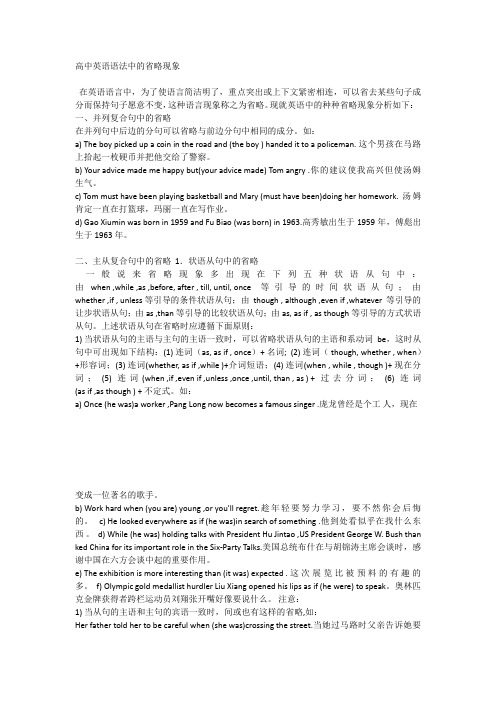
高中英语语法中的省略现象在英语语言中,为了使语言简洁明了,重点突出或上下文紧密相连,可以省去某些句子成分而保持句子愿意不变,这种语言现象称之为省略。
现就英语中的种种省略现象分析如下:一、并列复合句中的省略在并列句中后边的分句可以省略与前边分句中相同的成分。
如:a) The boy picked up a coin in the road and (the boy ) handed it to a policeman. 这个男孩在马路上拾起一枚硬币并把他交给了警察。
b) Your advice made me happy but(your advice made) Tom angry .你的建议使我高兴但使汤姆生气。
c) Tom must have been playing basketball and Mary (must have been)doing her homework. 汤姆肯定一直在打篮球,玛丽一直在写作业。
d) Gao Xiumin was born in 1959 and Fu Biao (was born) in 1963.高秀敏出生于1959年,傅彪出生于1963年。
二、主从复合句中的省略 1.状语从句中的省略一般说来省略现象多出现在下列五种状语从句中:由 when ,while ,as ,before, after , till, until, once等引导的时间状语从句;由whether ,if , unless 等引导的条件状语从句;由though , although ,even if ,whatever等引导的让步状语从句;由 as ,than 等引导的比较状语从句;由as, as if , as though 等引导的方式状语从句。
上述状语从句在省略时应遵循下面原则:1) 当状语从句的主语与主句的主语一致时,可以省略状语从句的主语和系动词be,这时从句中可出现如下结构:(1) 连词(as, as if , once)+ 名词; (2) 连词( though, whether , when)+形容词;(3) 连词(whether, as if ,while )+介词短语;(4) 连词(when , while , though )+ 现在分词; (5) 连词(when ,if ,even if ,unless ,once ,until, than , as ) + 过去分词; (6) 连词(as if ,as though ) + 不定式。
高考英语语法知识点归纳总结:省略句

④Child as he is, he knows a lot.
虽然他还是一个孩子,却懂得很多
介词的省略
①both后常跟of短语,其后可以接名词复数形式,也可以接代词宾格复数形式。接复数名词时,介词of可以省略,但接代词宾格时,of不能省略。
②在现在完成时表持续和重复的句型中,一段时间前的介词for可以省略。
这双鞋穿破了,已经穿了很长一段时间了。
③Trees can prevent the earth (from) being washed away.
树能阻止泥土被冲走。
Can you stop him (from) going swimming in the river?
你能阻止他下河洗澡吗?
I have some difficulty (in) answering the question.
约翰一定在踢球,而玛丽一定在做作业。
②His suggestions made John happy, but (his suggestions made) Mary angry.
他的建议使约翰高兴,却使玛丽很生气。
③Old McDonald gave up smoking for a while, but (he) soon returned to his old ways.
有些动词,tell, ask, allow, expect, force, invite, permit, persuade, order, warn, wish, would like,forbid等后跟动词不定式作宾语补足语、主语补足语时,不定式承前省略动词原形,保留动词不定式符号to。
He didn't come, though we had invited him to (come).
高中英语语法专题复习省略句
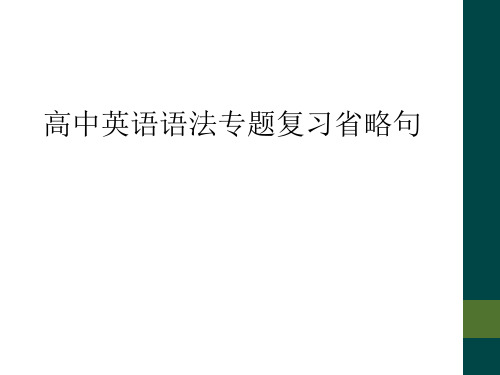
His suggestion is that we (should) set out right away.
The order that we (should) stay where we are is very serious and severe.
省略相同的谓语动词
三 复合句中的省略
1、主句中有一些成分被省略,如:
( I’m Sorry to hear you are ill. ()It’s a ) Pity that he missed such a good chance.
主句中有一些成分被省略、而用so或not来代替
-Are you leaving for Beijing this Sunday -I think so. I’m leaving for Beijing this Sunday.
–Are you an engineer – No, but I want to . be –He hasn’t finished the task yet.
–Well, he ought to .have
Attention !
使役动词及感官动词后面作宾语补足语的不定 式一定要省去to,但在被动语态中须将to复原。
If I had a lot of money, I’d aid the poor children.
Had I a lot of money, I’d aid the poor children. Should there be bird-flu, what would we do
在含有表示“命令、要求、建议、许可”或“禁止” 等意义的名词性从句中使用“should + 动词原形” 表示虚拟语气的,should常可以省略。如:
高中英语中的省略现象

高中英语中的省略现象甘肃省武威第七中学王忠文733006省略,是英语中比较常见的一种语法现象,它是对句子中的一个或几个句子成分进行省略,以使得语句更加的简洁,概括,重点突出。
那么,在高中的英语中有哪些常见的省略现象呢?下面,笔者从以下几个方面进行阐述。
1.虚拟语气中的省略在if引导的虚拟条件句中,若句子中有were; had; should时,可以将if 省略,把were; had; should提前,构成倒装。
Eg: If you had come here on time ,you would not have missed the chance.省略为Had you come here on time ,you would not have missed the chance. 2.名词性从句中的省略在由一个坚持(insist),两个命令(order,command),三个建议(advise, suggest,propose),四个要求(ask, demand ,require, request,)引导的宾语从句以及这些动词的同源名词引导的同位语从句,主语或表语从句,都要采用虚拟语气,而从句中的谓语动词都为should + v, should 可以省略。
The teachers suggest that we (should) hand in homework on time .3.状语从句中的省略分词作状语的本质是状语从句的省略,是省略了主语及be 的相应变化形式的从句。
Eg:When (you are ) drinking to someone’s health , you raise your glass but do not touch .4.定语从句中的省略①关系代词的省略当先行词在从句中做宾语时,可以省略关系代词。
Eg: This is the factory (which/that) we visited last year.②非谓语动词作后置定语的本质是省略了关系代词及be 的相应变化形式的定语从句,相反,定语从句的被动语态,将来时,进行时都可以转化为相对应的非谓语动词作后置定语。
【英语知识点】英语省略句语法总结及例句

【英语知识点】英语省略句语法总结及例句英语中的省略是为了避免重复、突出新信息并使上下文紧密连接的一种语法修辞手段。
省略在英语语言中,尤其在对话中,是一种十分普遍的现象。
省略句是英语的一种习惯用法。
1.省略介词:I've studied English (for) five years.我已学五年英语了。
2.省略连词that:I believe (that) you will succeed.我相信你们会成功的。
3.省略关系代词:I'll give you all (that) I have.我要把我所有的一切都给你。
1.省略主语:(You) Open the door,please.请开一下门。
2.省略谓语:Who (es) next?该谁了?3.省略主谓语或主谓语的一部分:(There is) No smoking.禁止抽烟。
4.省略表语:Are you thirsty ? 你30岁了吗?Yes,I am (thirsty).是的,我是。
5.省略宾语:Let's do the dishes. I'll wash and you'll dry(dishes). 让我们洗碗吧,我来洗,你来揩干。
6.省略状语:He was not hurt. (how)Strange! 他没有受伤,真奇怪!7.同时省略几个成分:(I wish) Good luck (to you) .祝你好运/祝你顺利。
1.为避免重复而进行的省略。
当一个句子中有两个或更多相同的词、短语出现时,其中的第一个须保留,其余的往往省略,以达到避免重复、使句子简练的目的。
高考中尤其要注意的情况是:当时间状语从句、地点状语从句、方式状语从句、让步状语从句、条件状语从句等状语从句中的主语与主句的主语一致并含有be时,往往将该状语从句中的主语和be一同省略。
2.语法上的省略。
有些成分的省略是出于语法上的原因——使表述更为简明,例如:He got up at six (o’clock).他六点钟起床。
英语语法---省略
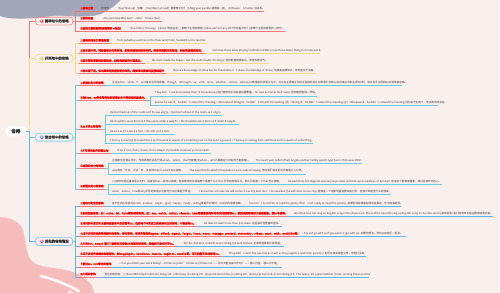
省略1简单句中的省略2并列句中的省略3复合句中的省略4其他的省略情况1.省略主语2.省略宾语3.省略主语和谓语(或谓语的一部分)1.动词不定式的省略2.某些使役动词,如:m a k e,le t,h a v e等和感官动词,如:see,w a t c h,no ti ce,o b ser v e,h ear等后⾯作宾补的不定式须省略t o,但若这些动词⽤于被动语态,则t o不省略。
3.并列的不定式可以省略后⾯的不定式符号t o。
但若两个不定式之间表⽰对⽐关系时,不能省略t o。
4.当不定式在某些动词后作宾语时,常可省略。
常⻅的动词有agree,a ff or d,e xp ec t,f orge t,h o p e,k no w,m anage,p re t en d,re m e mb er,re f use,w an t,wi s h,w oul d l ik e等。
5.介词b u t,e x ce pt (除了) 前有实义动词d o的某种形式时,后⾯的不定式不带t o。
6.当不定式作某些复合谓语时,如b e go i ng t o,b e a b le t o,h a v e t o,oug ht t o,use d t o等,可只保留不定式符号t o。
7.使⽤so,no t等时的省略8.介词的省略(Y ou co m e) Thi s w a y,p lease. 请这边⾛。
(省略了主语和谓语) (Ha v e y ou) G o t an y i n k? 你有墨⽔吗?(省略了主语和谓语的一部分)常⻅的结构有: (1)h a v e diffi cul ty/t rou b le (i n) d o i ng s th. (2)b e b us y (i n) d o i ng s th. (3)s p en d so m e tim e (i n) d o i ng s th. (4)s t o p/p re v en t s b. (f ro m) d o i ng s th. Th e h ea vy ra i n p re v en t e d him (f ro m) arr ivi ng th ere on tim e.—Can y ou fi n i s h y our w or k t o d a y? —I thi n k so./I d on’t thi n k so./I thi n k no t. ——你今天能完成⼯作吗? ——我认为能。
高考英语语法词汇专项突破:动词不定式省略标志词to的情况

高考英语语法词汇专项突破:动词不定式省略标志词to的状况大家知道动词不定式是由动词原形与标志词to构成,就是常见的to do sth.形式,但是却有不少状况下作为标志词的小品词to不见了。
这是怎么回事呢?现在就跟同学们聊聊不定式省掉to的那些事儿。
一、作宾语补足语的不定式省掉to的状况(一)当let, make, have等使役动词后跟不定式作宾语补足语时,不定式必需省略to。
但是假如使役动词用在被动语态中则to不行以省掉,其实let与have极少用于被动语态。
像get, force, oblige等使役动词跟不定式作宾补时无论用于主动还是被动to都不行以省掉。
如:1. There is no need to tell me your answer now. Give it some thought and then let me know.(XXXX·安徽卷30)2. My parents have always made me feel good about myself, even when I was twelve.(XXXX江苏35)3. She had him dig away the snow.她让他把雪挖走。
4. The law obliged parents to send their children to school. 法律要求父母送子女上学。
【考例】(XXXX·浙江卷短文改错)The position of the classroom with its view made me felt like I was dreaming.【答案与解析】felt改为feel。
考查使役动词make sb. do sth的用法,make跟不定式作宾语补足语在主动语态中不带to,me与宾语feel之间是规律上主谓关系,不能用表示被动意义的过去分词felt。
(二)当表示感觉的动词feel, hear, notice, observe, see, watch, look at, listen to等跟不定式作作宾语补足语时,在主动语态中不定式省略to,但是在被动语态中的to须带上。
高中英语语法之省略句

省略句一、状语从句的省略1、从句主语与主句主语一致(it)2、从句中含有be,省略主语+bee.g. While (he was) watching TV , he heard a knock at the door.While (he was) in America , he picked up some English.If (it is ) heated , water boils.When seeing his mother , the baby cried.……the baby sa w……When to do疑问词+分词(状语)疑问词+不定式(主语/宾语/表语)e.g. When to have a meeting is not decided.He has no room to put his books in.……in which to put his books.if ever/ if not/ if any /if possible二、不定式的省略1、e.g. --Would you like to go with me?--l’d like to.He is not what he used to be.2、be 不省三、e.g. than it actually isWe are both foolish.How foolish we both are!Tom plays football as will as , if not better than Mike.四、I think so/l don’t think so.I hope so/l hope notI’m afraid so/l’m afraid not。
高中英语语法省略句

有时整个主句都可省略, 这种 省,略通出现在简短答中。
---Are you going to buy the house? ---Unless my wife objects.
---You all like the story? ---yes, except that the end is
too surprising.
Ellipsis
省略句
1.简单句中的省略现象 1)句首省略
省略了句子的主语,有时还连 同谓语动词一起省略
•Sounds like a good idea. •Pity we live so far from the sea. •Beautiful day, isn’t it?
Wonder what she is doing. Forgotten my name? Nobody at home. 2)答语的省略(注意)
15. Tom was attacked by cramp while _____s_w_i_m(smwiinmg) across the river.
16. —Have you ever been to the
seaside?
(语法填空)
—No, we can’t afford__to___.
17. When first i_n_t_r_o_d_u_c_e_d (introduce)
在than或as引起的从句中的省略
•Many others are doing better than we are. •He works harder than ever. •Jane is as tall as I. •They will try to put the plan into practice as quickly as possible.
英语语法-省略、插入语和反意疑问句

高考英语核心语法学案:省略、插入语和反意疑问句在英语中,有时为了避免结构上或内容上的重复,并使上下文紧密连接;有时因为语法的客观要求,句子中的一个或几个成分不需要表达出来,这种现象称为省略。
省略有词法上的省略,也有句法上的省略,还有一种替代省略。
省略部分的成分和含义可从上下文或具体语言环境中找到而且是有章可循的。
【省略的类型】一、简单句中的省略【翻译句子】(1)好久不见了!Haven't seen you for ages! (省略主语)(2)你要什么东西吗?(Is there) Anything you want? (省略谓语)(3)我不知道他是谁。
I don't know (who he is).(省略宾语)(4)你有墨水吗?(Have you) Got any ink? (省略主语和谓语或谓语的一部分,只剩下表语、宾语、状语或其他成分)【结论1】有些简单句中可以省略主语、谓语、宾语或主语和谓语。
二、并列句中的省略【翻译句子】(5)他教英语,他弟弟教数学。
He teaches English and his brother maths.【结论】在并列句中,如果后面的分句与前面的分句有相同的部分,这一部分则常被省略掉,以免重复。
三、复合句中的省略1. 在含有状语从句的复合句中【翻译句子】(6)当被问到她是谁的时候,她一句话也没说。
When (she was) asked, she didn't answer a word.【结论1】在含有状语从句的复合句中,若从句的主句是it或与主句的主语相同,且在谓语中含有be时,常省略从句的主语和be。
【疑难1】Should it rain tomorrow, we would have to put off the visit till next week.要是明天下雨的话,我们将不得不将访问推迟到下个礼拜。
【疑难剖析1】虚拟条件句中,含had, were, should时,若将它们提到句首,则需省略if。
高中英语语法_省略

高中英语语法_省略高中英语语法:省略现象解析在英语语法中,省略是一种常见的语言现象。
它指的是在某些语境中,一些语言成分可以省略,而不会影响句子的完整性和理解。
省略现象主要出现在句子、从句或介词短语中。
本文将通过分析省略现象,帮助高中生更好地掌握英语语法。
一、句子的省略在英语中,省略句子成分是很常见的。
以下是一些常见的省略句子成分的情况:1、省略主语在某些情况下,句子可以省略主语,而不会影响句子的意思。
例如:(1)Sorry, I can't come. (我无法来。
)(2)Open the door, please. (请开门。
)2、省略谓语在一些简单句或祈使句中,谓语动词经常被省略。
例如:(1)Wash your hands before meals. (饭前要洗手。
)(2)Pick up the book on the floor. (把地上的书捡起来。
)3、省略宾语在一些简单句中,宾语可以省略。
例如:(1)She wants to buy a new dress. (她想买个新裙子。
)(2)I like eating fruits. (我喜欢吃水果。
)二、从句的省略在英语中,从句的省略现象也很常见。
以下是一些常见的从句省略情况:1、省略主语和谓语在定语从句中,如果主语和谓语与先行词一致,可以省略它们。
例如:(1)The man who is standing under the tree is my brother. (站在树下的那个男人是我的哥哥。
)(2)The book that you lent me is very interesting. (你借给我的那本书很有趣。
)2、省略作主语的代词和be动词在由that引导的定语从句中,作主语的代词和be动词通常可以省略。
例如:(1)The child (that) I taught is now a doctor. (我教过的那个孩子现在是一名医生。
高考英语语法 省略与高考教案

高考英语语法——省略与高考教案一、教学目标1. 让学生掌握省略的基本概念和用法。
2. 培养学生正确运用省略句进行表达的能力。
3. 提高学生对高考英语语法的理解和运用。
二、教学内容1. 省略的概念及分类。
2. 省略句的构成和用法。
3. 省略在高考英语试题中的应用。
三、教学重点与难点1. 省略的基本概念和分类。
2. 省略句的构成和用法。
3. 高考英语中省略句的运用。
四、教学方法1. 采用实例分析法,让学生通过具体例子理解省略的概念和用法。
2. 采用练习法,让学生通过练习提高运用省略句的能力。
3. 采用对比法,让学生通过对比分析,掌握省略句的特点。
五、教学步骤1. 引入省略的概念,让学生了解省略句的基本概念。
2. 通过实例分析,让学生掌握省略句的构成和用法。
3. 进行课堂练习,让学生巩固所学知识。
4. 分析高考英语试题中的省略句,让学生了解省略句在高考中的运用。
5. 进行高考模拟练习,提高学生的应试能力。
六、教学评估1. 课堂练习:观察学生在练习中的表现,评估他们对省略概念的理解和应用能力。
2. 小组讨论:通过小组讨论,了解学生对省略句的讨论情况和合作能力。
3. 高考模拟试题:分析学生在模拟试题中的答题情况,评估他们的应试能力。
七、教学拓展1. 邀请英语老师或语言专家进行讲座,让学生深入了解省略句在实际语言运用中的重要性。
2. 组织学生参加英语角活动,让学生有机会在实际交流中运用省略句。
3. 引导学生阅读英语文章,分析文章中的省略句,提高他们的阅读理解能力。
八、教学反馈1. 课堂反馈:鼓励学生在课堂上积极提问和参与讨论,及时解答他们的疑问。
2. 作业反馈:及时批改学生的作业,给予具体指导和鼓励性的评价。
3. 学生评价:定期收集学生的反馈意见,了解他们的学习需求和教学效果。
九、教学反思1. 反思教学内容:根据学生的掌握情况,调整教学内容和进度,确保学生能够扎实掌握省略句的知识。
2. 反思教学方法:根据学生的反馈和学习效果,调整教学方法,提高教学效果。
高中英语语法特殊句式(倒装、省略、强调)
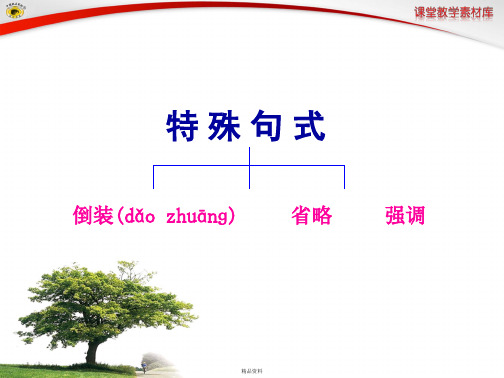
3.在对话或并列句中,如果主语(zhǔyǔ)、谓语不同,而宾语相同, 则常省去相同的宾语部分。 Tom enjoys dancing, but Peter hates (dancing).
精品资料
4.省略作宾语的不定式短语,只保留to,但如果该宾语是动词 be或完成时态,则须在之后加上be或have: —Are you going there? —Yes, I’d like to (go there). 注意(zhù yì):在下列词后常省略不定式但要保留to: want, wish, like, hate, hope, intend, plan, love, refuse, expect,但当 want 和like用于从句中时,to常常省略。
My office was on the tenth floor, and his (office was) on the twelfth (floor). 并列句的省略有时还可出现在前面(qián mian)的分句 中,这时被省略的词语便出现在下文。
精品资料
5.only + 状语(zhuàngyǔ)(副词、介词短语、状语(zhuàngyǔ)从句)放在句首时 。(部分倒装) 1)Only then did I realize the value of reading aloud every morning. 2)Only by means of talking can we avoid misunderstanding each other.
精品资料
2.方位词in, out, there, here, inside, outside, up, down, away, off, downstairs, upstairs等以及now, then置于句首时,谓语动词常用 be, come, go, lie, run等,并且句子的主语(zhǔyǔ)是名词。为以示 强调或为了使情景更生动, 要全部倒装。(全部倒装) 1) Away flew the bird which I bought yesterday. 2) Now comes your turn to sweep the floor. 注意: 主语(zhǔyǔ)是人称代词时,仍用自然语序。 Away they went. (=They went away.)
高考英语语法省略
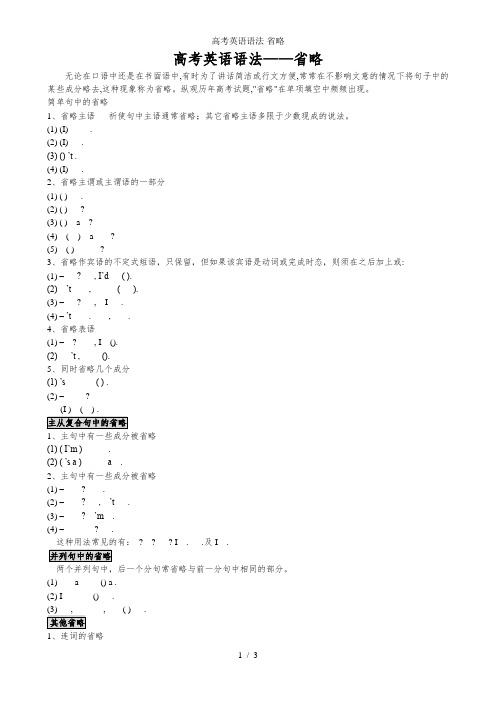
高考英语语法——省略无论在口语中还是在书面语中,有时为了讲话简洁或行文方便,常常在不影响文意的情况下将句子中的某些成分略去,这种现象称为省略。
纵观历年高考试题,"省略"在单项填空中频频出现。
简单句中的省略1、省略主语祈使句中主语通常省略;其它省略主语多限于少数现成的说法。
(1) (I) .(2) (I) .(3) () ’t .(4) (I) .2、省略主谓或主谓语的一部分(1) ( ) .(2) ( ) ?(3) ( ) a ?(4) ( ) a ?(5) ( ) ?3、省略作宾语的不定式短语,只保留,但如果该宾语是动词或完成时态,则须在之后加上或:(1) –? , I’d ( ).(2) ’t , ( ).(3) –? , I .(4) –’t . , .4、省略表语(1) –? , I ().(2) ’t , ().5、同时省略几个成分(1) ’s ( ) .(2) –?1、主句中有一些成分被省略(1) ( I’m ) .(2) ( ’s a ) a .2、主句中有一些成分被省略(1) –? .(2) –? , ’t .(3) –? ’m .(4) –? .? ? ? I . .及I .两个并列句中,后一个分句常省略与前一分句中相同的部分。
(1) a () a .(2) I () ., ( ) .1、连词的省略(1) 宾语从句中常省略连词,但也有不能省略的情况。
(2) 在定语从句中,在从句中作宾语时可省略.另外,凡是进行时态和被动语态的定语从句都可省略关系代词和动词。
2、在某些状语从句中,从句的主语与主句的主语一致时,可省去“主语”部分(1) ( ) a 10, .(2) ( ) .(3) ( ) .(4) ( ) I’ .状语从句的省略原则主要是:如果从句中的主语和主句中的主语一致,就可以经过一定的变动把状语从句中的主语和谓语的一部分或全部省略,从而使语言更加简洁、明了。
新高考英语语法专题透析—省略结构
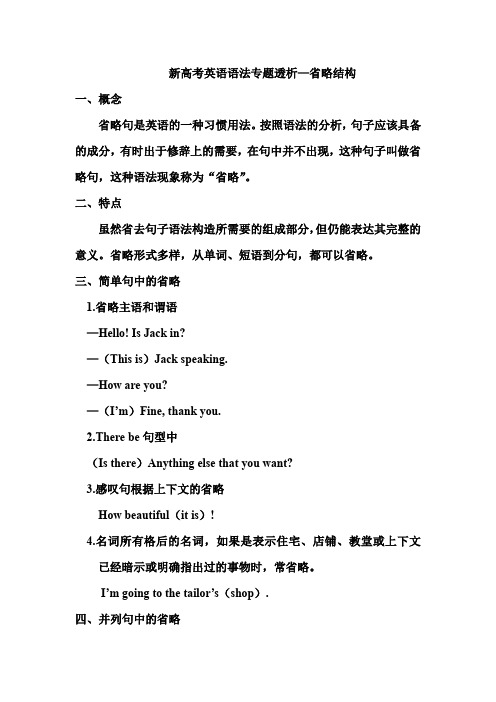
新高考英语语法专题透析—省略结构一、概念省略句是英语的一种习惯用法。
按照语法的分析,句子应该具备的成分,有时出于修辞上的需要,在句中并不出现,这种句子叫做省略句,这种语法现象称为“省略”。
二、特点虽然省去句子语法构造所需要的组成部分,但仍能表达其完整的意义。
省略形式多样,从单词、短语到分句,都可以省略。
三、简单句中的省略1.省略主语和谓语—Hello! Is Jack in?—(This is)Jack speaking.—How are you?—(I’m)Fine, thank you.2.There be句型中(Is there)Anything else that you want?3.感叹句根据上下文的省略How beautiful(it is)!4.名词所有格后的名词,如果是表示住宅、店铺、教堂或上下文已经暗示或明确指出过的事物时,常省略。
I’m going to the tailor’s(shop).四、并列句中的省略1.如果后面分句中有与前面相同的部分常被省略。
She is not fond of cooking, nor am I(fond of cooking).2.有时并列句中的省略部分出现在前面的分句中时,要看完最后一个分句才能掌握全句的完整意义。
Tom lives(in London), and John works in London.五、复合句中的省略1.宾语从句中的省略(1)由特殊疑问词引导的宾语从句中,若有与前面主句重复的内容,则可将重复内容省略,而只保留特殊疑问词。
You look upset. Can you tell me why?(2)在I think/I believe/I hope/I guess/I’m afraid等作答句,后面跟“so”与“not”分别等于肯定或否定时,宾语从句可省去。
—Do you believe he will pass the exam?—I believe so.(=I believe he will pass the exam.)—Do you think it will snow?—I hope not.(=I hope that it will not snow.)(3)在know/think/consider/suppose/find/believe/say/decide等动词后面所接的宾语从句中,连词that可以省略;若带有多个宾语从句,只有第一个that可以省略,其余的则不能省略。
英语省略句

高考英语考点-省略句省略句是高考考查的语法重点,又是学习的难点。
在英语中,为了使句子简洁明快,突出重点,常用"省略句",只要不影响句意的表达,能省略的成分尽可能省略。
省略现象随处可见,大致可分为以下几种情况。
一、句子成分的省略1. 省略主语。
如:Haven't seen you for ages!好久不见了!2.省略谓语。
如:(Is there) Anything you want? 你要什么东西吗?(Does) Anybody need help? 有人要帮忙吗?3. 省略宾语。
如:I don't know (where he is ). 我不知道。
4.省略主语和谓语(或谓语的一部分),只剩下表语、宾语、状语或其它成分。
如:(I'm) Afraid I can't come. 恐怕我不能来了。
(Have you) Got any ink? 你有墨水吗?【高考链接】-It’s a long time since I saw my sister.(2007全国卷1)-_________her this weekend?A. W hy not visitB. Why not to visitC. Why not visitingD. Why don’t visit解析:答案为A。
本题考察省略结构,这里why not visit =Why didn’t you visit ,这种既注重基础又兼顾生活交际的试题,其实多数学生感觉很容易能得出正确的A答案。
二、复合句的省略1.在含有状语从句的复合句中由when,while,as, once,whenever引导的时间状语从句;或由if,unless引导的条件状语从句;由though,although,even if ,even though引导的让步状语从句;由as though,as if,as引导的方式状语从句;由because引导的原因状语从句;由wherever引导的地点状语从句,若从句的主句是it或与主句的主语相同,且在谓语中含有be时,常省略从句的主语和be。
高中英语语法之省略
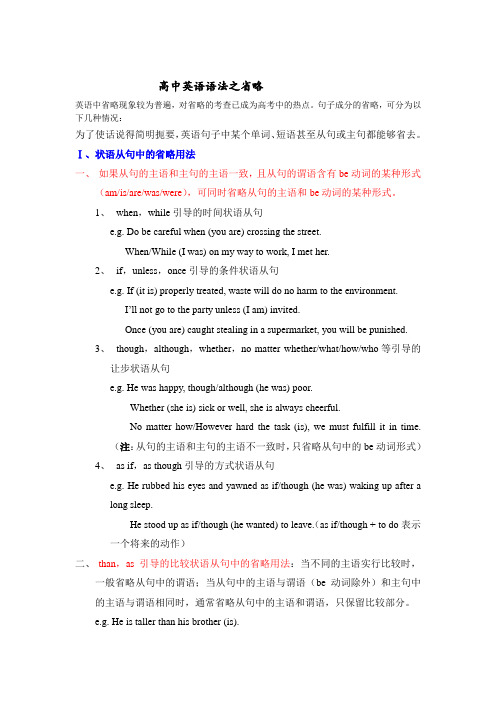
高中英语语法之省略英语中省略现象较为普遍,对省略的考查已成为高考中的热点。
句子成分的省略,可分为以下几种情况:为了使话说得简明扼要,英语句子中某个单词、短语甚至从句或主句都能够省去。
Ⅰ、状语从句中的省略用法一、如果从句的主语和主句的主语一致,且从句的谓语含有be动词的某种形式(am/is/are/was/were),可同时省略从句的主语和be动词的某种形式。
1、when,while引导的时间状语从句e.g. Do be careful when (you are) crossing the street.When/While (I was) on my way to work, I met her.2、if,unless,once引导的条件状语从句e.g. If (it is) properly treated, waste will do no harm to the environment.I’ll not go to the party unless (I am) invited.Once (you are) caught stealing in a supermarket, you will be punished.3、though,although,whether,no matter whether/what/how/who等引导的让步状语从句e.g. He was happy, though/although (he was) poor.Whether (she is) sick or well, she is always cheerful.No matter how/However hard the task (is), we must fulfill it in time.(注:从句的主语和主句的主语不一致时,只省略从句中的be动词形式)4、as if,as though引导的方式状语从句e.g. He rubbed his eyes and yawned as if/though (he was) waking up after along sleep.He stood up as if/though (he wanted) to leave.(as if/though + to do表示一个将来的动作)二、than,as引导的比较状语从句中的省略用法:当不同的主语实行比较时,一般省略从句中的谓语;当从句中的主语与谓语(be动词除外)和主句中的主语与谓语相同时,通常省略从句中的主语和谓语,只保留比较部分。
高考英语语法之省略知识精讲讲义

二十五、省略知识精讲为了避免重复,或为了使句子更简练,在一些句子中常常省去某些成分,这在英语中叫做省略。
一、在and连接的句子中,为避免重复常省略相同的部分(主语等)She set out soon after dark and arrived home an hour later.二、状语从句中的省略1.在while, when, whenever, till, as soon as, if, unless, as if,as, whether 等引导的状语从句中,若谓语动词有be,而主语又与主句的主语相同或主语是it时,常省略从句的主语和be,成为“连词+非谓语动词/形容词”形式作状语。
Errors, if (there are) any, should be corrected.如果有错误,就应该改正2.在as,than,however, whatever, no matter what等引导的从句中常省略某些成分the speaks English better than anyone else(speaks)in the class.她英语讲得比班上其他人3.虚拟语气条件句中常省略if将were.should,had提到主语前构成倒装语序三、定语从句中的省略.1.在限制性定语从句中,作宾语用的that,which,whom 可省略,在the same...as 和such.. as 引出的某些定语从句中可省略与主句相同的部分I don't like such a book as this (is).我不喜欢这样的一本书.定语从句中、“关系代词作主语+系动词be”可以省略,成为现在分词短语(表主动)或过去分词短语(表被动)作后置定语The goods (which were) ordered last month haven't arrived yet. 上个月订购的货物还未到I know the boy (who is) sleeping there.四、名词性从句的省略在know,think, consider, suppose, find, believe, say, decide 等动词后面接的宾语从句中,连词that可省略,若带有多个宾语从句,只能省第一个that,其余的不能省。
英语语法复习解答:省略的作用和原则
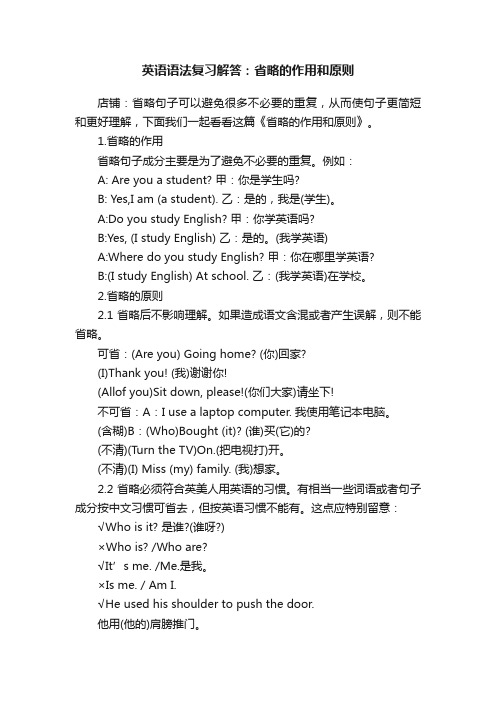
英语语法复习解答:省略的作用和原则店铺:省略句子可以避免很多不必要的重复,从而使句子更简短和更好理解,下面我们一起看看这篇《省略的作用和原则》。
1.省略的作用省略句子成分主要是为了避免不必要的重复。
例如:A: Are you a student? 甲:你是学生吗?B: Yes,I am (a student). 乙:是的,我是(学生)。
A:Do you study English? 甲:你学英语吗?B:Yes, (I study English) 乙:是的。
(我学英语)A:Where do you study English? 甲:你在哪里学英语?B:(I study English) At school. 乙:(我学英语)在学校。
2.省略的原则2.1省略后不影响理解。
如果造成语文含混或者产生误解,则不能省略。
可省:(Are you) Going home? (你)回家?(I)Thank you! (我)谢谢你!(Allof you)Sit down, please!(你们大家)请坐下!不可省:A:I use a laptop computer. 我使用笔记本电脑。
(含糊)B:(Who)Bought (it)? (谁)买(它)的?(不清)(Turn the TV)On.(把电视打)开。
(不清)(I) Miss (my) family. (我)想家。
2.2省略必须符合英美人用英语的习惯。
有相当一些词语或者句子成分按中文习惯可省去,但按英语习惯不能有。
这点应特别留意:√Who is it? 是谁?(谁呀?)×Who is? /Who are?√It’s me. /Me.是我。
×Is me. / Am I.√He used his shoulder to push the door.他用(他的)肩膀推门。
×He used shoulder to push the door.√When you go out, take an umbrella.出门带伞。
- 1、下载文档前请自行甄别文档内容的完整性,平台不提供额外的编辑、内容补充、找答案等附加服务。
- 2、"仅部分预览"的文档,不可在线预览部分如存在完整性等问题,可反馈申请退款(可完整预览的文档不适用该条件!)。
- 3、如文档侵犯您的权益,请联系客服反馈,我们会尽快为您处理(人工客服工作时间:9:00-18:30)。
高考英语语法——省略无论在口语中还是在书面语中,有时为了讲话简洁或行文方便,常常在不影响文意的情况下将句子中的某些成分略去,这种现象称为省略。
纵观历年高考试题,"省略"在单项填空中频频出现。
简单句中的省略1、省略主语祈使句中主语通常省略;其它省略主语多限于少数现成的说法。
(1) (I) Thank you for your help.(2) (I) See you tomorrow.(3) (It) Doesn’t matter.(4) (I) Beg your pardon.2、省略主谓或主谓语的一部分(1) (There is) No smoking .(2) (Is there) Anything wrong ?(3) (Will you) Have a smoke ?(4) What/How (do you think) about a cup of tea ?(5) Why (do you) not say hello to him ?3、省略作宾语的不定式短语,只保留to,但如果该宾语是动词be或完成时态,则须在之后加上be或have:(1) –Are you going there? --Yes, I’d like to (go there).(2) He didn’t give me the chance, though he had promised to (give me the chance).(3) –Are you an engineer? --No, but I want to be.(4) –He hasn’t finished the task yet. --Well, he ought to have. 4、省略表语(1) –Are you thirsty? --Yes, I am (thirsty).(2) His brother isn’t lazy, nor is his sister (lazy).5、同时省略几个成分(1) Let’s meet at the same place as (we met) yesterday.(2) –-Have you finished your work ?(1) ( I’m ) Sorry to hear you are ill.(2) ( It’s a ) Pity that he missed such a good chance.2、主句中有一些成分被省略(1) –Is he coming back tonight? --I think so.(2) –She must be busy now? --If so, she can’t go with us.(3) –Is she feeling better today? --I’m afraid not.(4) –Do you think he will attend the meeting? --I guess not.这种用法常见的有:How so? Why so? Is that so? I hope so. He said so.及I suppose/believe/hope not.(1) My father is a doctor and my mother (is) a nurse.(2) I study at college and my sister (studies) at high school.(3) When summer comes, the day is getting longer and longer, and the night省略(1) 宾语从句中常省略连词that,但也有不能省略的情况。
(2) 在定语从句中,that在从句中作宾语时可省略.另外,凡是进行时态和被动语态的定语从句都可省略关系代词和be 动词。
2、在某些状语从句中,从句的主语与主句的主语一致时,可省去“主语+be”部分(1) When (he was) still a boy of 10, he had to work day and night.(2) She tried her best though (she was) rather poor in health.(3) If (you are) asked you may come in.(4) If (it is) necessary I’ll explain to you again.状语从句的省略原则主要是:如果从句中的主语和主句中的主语一致,就可以经过一定的变动把状语从句中的主语和谓语的一部分或全部省略,从而使语言更加简洁、明了。
现就把各种状语从句的省略。
现象列举如下:一、时间状语从句中的省略When (she was) very young, she began to learn to play the piano.她很小时,就开始学习弹钢琴。
While (I was) at college, I began to know him, a strange but able student. 我在上大学时就开始认识他,一个奇怪但有能力的学生When arriving, send me a telegram. (When you arrive, send me a telegram.) 到达之后,来个电报Don’t come in until (you are) asked to.不叫你请你不要进来Whenever (it is )possible, you should come and help.不管什么时候只要有可能就来帮忙。
You should let us know the result as soon as(it is) possible.你应尽快让我们知道结果。
注:as在引导时间状语从句时,没有这种省略现象。
我们不可说As walking, she found a nice shining thing on the ground. 二、地点状语从句中的省略. 地点状语从句的省略常用下列结构:where(ver) possible, where(ver) necessary,Lay these books where possible you can find them easily. 把这些书放在你可能容易找到的地方。
Put in articles wherever necessary in the following passages.在下列文章中需要的地方填入冠词三、条件状语从句中的省略常用的句型是:if necessary, if possible, if true, if anyone等。
如:Send the goods now if (they are) ready.货物如果准备好了,请送过来。
He will come if (he is) asked. 如果叫他来,他就来If (it is) necessary, ring me at home.如果有可能,朝我家里打电话。
Come along with me if (it is) possible.如果有可能和我一起去吧。
If (it is) true, this will casue us a lot of trouble.如果是真的,这会给我们带来很多麻烦。
There are few people nowadays, if (there are) any, who remember him. 很少有人能记起他。
You should stay where you are, unless (you are) asked to leave. 。
四、让步状语从句中的省略He is a good man, though sometimes (he is) rather dull. 他真是个好人,尽管有时有点无聊。
Even if (I am ) invited to, I won’t go to such a bad lecture. 即使邀我去,我都不想听如此坏的报告五、比较状语从句中的省略She can play the piano just as wonderfully as you (do). 她钢琴弹的我你弹的一样好。
She has finished the work earlier than (it has been) expected. 她这项工作比预料的提前完成六、方式状语从句中的省略as if/as though后还可加n./a./ad./介词短语/现在分词/过去分词/不定式。
He acts as if (he were) a fool. 他的行为举止好象是个傻子。
She talked to the stranger as if (she were) absent-minded. 她和陌生人谈话似乎很不在意。
He opened the desk, as if (he was) in search of something important. 他打开抽屉仿佛要找一件什么重要的东西。
The boy is running impatiently here and there as if (he is) searching for something lost on the sports ground. 这男孩很不耐心地在操场上到处跑着仿佛在找什么东西。
The football player is rolling on the ground as if (he is) hurt badly in the leg.足球运动员在操场上打着滚似乎他的腿伤得厉害。
He moved his lips as if (he wanted )to speak. 他的嘴动着仿佛要说什么。
3、不定式符号to的省略(1) 并列的不定式可省去后面的 to.I told him to sit down and wait for a moment.(2) help 当“帮助”讲时,后面的宾语或宾补的不定式符号to可带可不带.I will help (to) do it for you.I will help you (to) do it.(3)介词but前若有动词do,后面的不定式不带 to.The boy did nothing but play.(4) 某些使役动词(let, make, have)及感官动词(see, watch, hear, notice, observe, feel, look at, listen to等)后面作宾语补足语的不定式一定要省去 to, 但在被动语态中须将to 复原。
